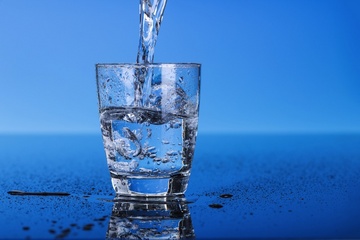Will Staying Hydrated Help with Weight Loss?

Drinking enough water may be one key to maintaining a healthy weight, according to a new study, which finds that there may be a link between staying hydrated and staying slim.
Among the people in the study, the less hydrated they were, the more likely they were to have a higher body mass index (BMI), according to the findings, published today (July 11) in the journal Annals of Family Medicine.
This suggests that water "may deserve greater focus in weight management research and clinical strategies," the researchers wrote in their study. [9 Healthy Habits You Can Do in 1 Minute (or Less)]
While people are often advised to drink water to help with weight loss, scientists have found that the results have been mixed when they looked at the role that the liquid plays in a person's weight, according to the study. Some studies, for example, have found that drinking more water is associated with a lower weight, while others have found that obese individuals drink more water.
In the new study, the researchers looked at two data sets that included about 9,500 people from the National Health and Nutrition Examination Survey (NHANES), which is an ongoing survey conducted by researchers at the Centers for Disease Control and Prevention that is unique because it combines interviews and physical examinations. One data set was from the 2009 to 2010 survey, and the other was from the 2011 to 2012 survey.
The survey participants submitted urine samples as part of the physical exam, and the researchers determined how hydrated they were by measuring their "urine osmolality," which means how concentrated a person's urine is. A higher concentration means that a person is less hydrated.
NHANES researchers started measuring urine osmolality in 2009, because it gives a more accurate assessment of how hydrated a person is, than asking people to recall how much water they drank. Other factors beyond how many cups of water a person drinks can influence hydration levels, including the water content of foods.
Sign up for the Live Science daily newsletter now
Get the world’s most fascinating discoveries delivered straight to your inbox.
In the new study, the researchers used urine osmolality to determine if a person was "adequately hydrated" or "inadequately hydrated."
They found that people who were inadequately hydrated had a higher BMI, on average, than those who were considered to be hydrated. In addition, inadequately hydrated people were nearly 60 percent more likely to be obese than people who were adequately hydrated, the researchers found.
However, the study only found an association between hydration levels and weight; it did not prove that drinking more water could help people lose weight.
"It could be that those people with higher BMI are more likely to be inadequately hydrated, due to the kinds and amount of food they eat or beverages they drink," said Dr. Tammy Chang, a family medicine physician at the University of Michigan and the lead author of the study. Water-rich foods, for example, tend to be lower in calories, while fat-rich foods, which have less water, are generally higher in calories, according to the study.
Another explanation is that people who stay well hydrated also practice behaviors that help protect them against obesity, Chang said.
It's possible that both explanations could be true, too, Chang added. But more studies are needed to understand the relationship between hydration and weight, she said.
Hungry or thirsty?
Although common weight-loss advice holds that people may confuse thirst with hunger, and that drinking more water may help with weight-loss efforts, in reality, it's unclear if this is actually what's going on, Chang said.
"In my practice, my patients tell me that they often read online that they should drink before eating, in case they are confusing hunger with thirst," Chang told Live Science. And indeed, clinicians sometimes recommend that patients drink water when they have the urge to eat, because it's thought that they may actually be thirsty rather than hungry, the researchers wrote in the study. [The Science of Hunger: How to Control It and Fight Cravings]
But it's very difficult to objectively measure thirst and hunger, as each person experiences these sensations differently, and people are influenced by other factors beyond the body's physiological needs, Chang said.
Indeed, Chang noted that she is not aware of any studies that specifically teased this out, because of how difficult it is to measure thirst and hunger.
Originally published on Live Science.










